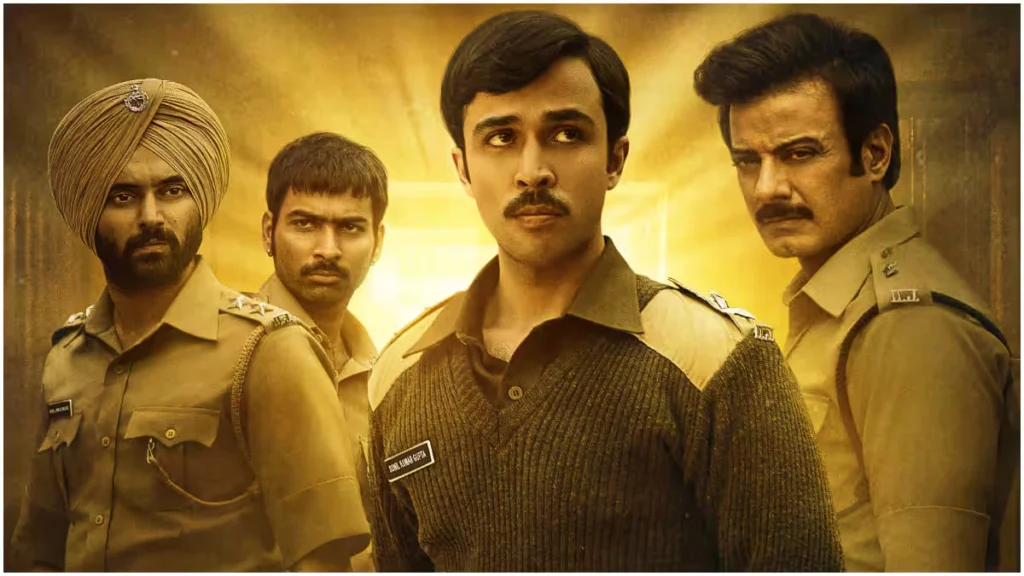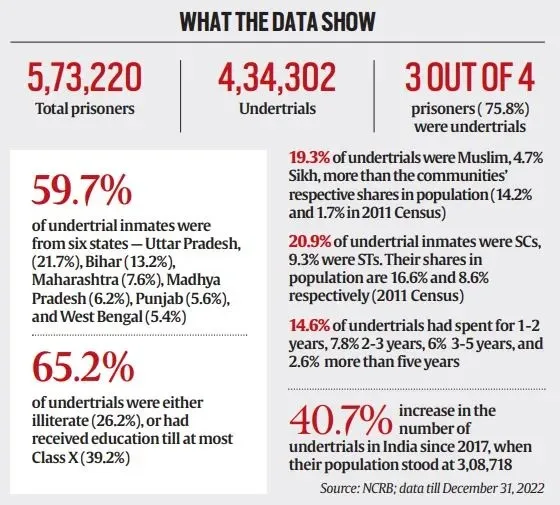
Black Warrant, a gripping seven-part series directed by Vikramaditya Motwane, delves deep into the gritty, complex world of Tihar Jail, one of Asia’s largest prisons. Based on the book by Sunil Kumar Gupta and journalist Sunetra Choudhury, this series presents an insider’s account of life behind bars, unraveling the power structures, corruption, and harsh realities of the prison system. Whether you’re a fan of crime dramas, or curious about the intricate dynamics of a high-security prison, Black Warrant offers a compelling narrative filled with real-life stories and insightful commentary.
1. Plot Overview
Black Warrant is inspired by Sunil Kumar Gupta’s real-life experiences as a jailer at Tihar Jail in the 1980s. The series follows his journey from a rookie prison guard to a seasoned, compassionate jailer, all while navigating the perilous dynamics within the prison walls. Gupta is portrayed by Zahan Kapoor, whose character brings a touch of humanity and justice to a system otherwise marred by corruption and abuse.
The series focuses on sensational criminal cases, including infamous figures such as Charles Sobhraj, the “Bikini Killer,” and the brutal rape-murder duo Billa-Ranga, providing a detailed look at the moral dilemmas faced by those working in the prison system. It also explores the culture within Tihar Jail, from caste-based divisions among gangs to the power structures that define inmate and guard interactions.
2. Key Themes Explored in the Series
- Power Structures and Hierarchies
One of the central themes of Black Warrant is the deep-seated caste and religious hierarchies within the prison. The show highlights how hardened criminals, along with those wrongly incarcerated, form complex power dynamics. These hierarchies often complicate the ability of jailers and wardens to maintain order, adding an extra layer of tension to the narrative. - Corruption and Injustice
Tihar Jail is depicted as a microcosm of systemic corruption, where abuse of power is rampant. From corrupt officers to bribery among the prison staff, the series showcases how deeply ingrained corruption undermines the prison’s intended purpose of rehabilitation. Gupta, however, stands out as a rare figure who strives for justice and reform. - Prison Life and the Human Condition
The series doesn’t shy away from the inhumane conditions in prisons. From the psychological toll of life on death row to the physical violence that often breaks out among inmates, Black Warrant paints a stark picture of the realities faced by both the incarcerated and the staff. - Reform and Rehabilitation
A key subplot of the show revolves around Gupta’s efforts to introduce reforms within the prison system. His creation of the first legal aid cell for poor undertrials is a testament to the series’ message that prisons, if properly managed, can contribute to rehabilitation rather than perpetuating criminality.
3. The Book: Black Warrant – An Insider’s Account
Before the web series, the story of Tihar Jail was brought to life through the book Black Warrant co-authored by Sunil Kumar Gupta and journalist Sunetra Choudhury. The book offers a raw, unfiltered look at the life inside one of Asia’s largest and most infamous prisons.
Gupta’s perspective as a jailer provides readers with a rare glimpse into the often-hidden workings of Tihar Jail. His journey from a naive rookie to a seasoned prison officer is both eye-opening and heart-wrenching. The book touches on his personal struggles, professional challenges, and the ethical dilemmas he faced while working in an environment rife with corruption and violence. Offers a humanistic view of prisoners, highlighting their personalities beyond their crimes. Exposes systemic corruption in Indian prisons, showing how wealth and political connections can lead to unequal treatment. Black Warrant isn’t just about crime; it’s about the complexities of justice, the morality of punishment, and the struggles for reform in a deeply flawed system.
While the series focuses on sensational criminal cases, the book offers a more nuanced exploration of the emotional and psychological impact of prison life. The real-life stories of prisoners, the struggles of undertrials, and the human cost of systemic corruption are powerfully conveyed. If you’re interested in the real-life inspiration behind the series, the book provides a deeper, more intimate look into the world of Tihar Jail.
5. The Main Characters and Their Performances
- Zahan Kapoor as Sunil Gupta
Zahan Kapoor plays the central character, Sunil Gupta, whose kindness and compassion set him apart from other prison staff. Unlike his colleagues who use brute force and intimidation, Gupta attempts to bring order through understanding and fairness. Kapoor’s performance highlights the internal struggle of a man trying to maintain his humanity in a world that often discourages it. - Sidhant Gupta as Charles Sobhraj
Known as the “Bikini Killer,” Sobhraj is portrayed as a cunning and manipulative figure who commands respect and fear inside the prison. His ability to get whatever he wants, from luxuries to escaping the prison itself, paints a chilling picture of the power dynamics that exist within the system. - Rahul Bhat as DSP Rajesh Tomar
Tomar, the senior officer in the prison, plays a crucial role in managing the operations of Tihar. His character grapples with the pressures of his job and his troubled personal life, adding emotional depth to the series. - Anurag Thakur as Vipin Dahiya and Paramvir Singh Cheema as Shivraj Mangat
These characters, both wardens, bring physicality and a sense of authority to the prison. They contrast with Gupta’s softer approach, providing a different perspective on how prison staff navigate the rough environment.
6. Real-Life Inspiration and Cases
Black Warrant draws inspiration from real-life events and infamous criminals associated with Tihar Jail. The series showcases some of the most notorious figures in Indian crime history, such as:
- Billa-Ranga: Two men who were involved in the brutal rape and murder of two young girls in Delhi.
- Charles Sobhraj: A notorious serial killer who was known for his charm and manipulation.
- Maqbool Butt: A leader of the Jammu and Kashmir Liberation Front who was executed in Tihar.
These real-life cases form the backbone of many episodes, providing a historical context to the events portrayed in the series.
7. The Harsh Realities of Prison Life
Prison life, as depicted in Black Warrant, is far from glamorous. The show doesn’t shy away from showing the violence, corruption, and inhumane conditions that define the prison experience. From brutal fights between inmates to the corrupt dealings that allow powerful prisoners to exploit the system, the series paints a grim but realistic picture of what life inside Tihar Jail is like.
8. Important Prison Terminology
The show introduces viewers to specific prison terminology that gives an authentic feel to the setting:
- Dekhbhal, Nigrani, Niyantran: The three tenets of prison management, which roughly translate to care, surveillance, and control.
- Chamgadad Banna: A form of torture where inmates are hung upside down and beaten.
- Black Warrant: A document written for prisoners who are sentenced to death, marking the end of their journey.
These terms add to the series’ authenticity, helping viewers understand the language and the brutal realities of life inside a high-security prison.
Conclusion
Black Warrant is not just another prison drama; it is an in-depth look at the corruption, violence, and systemic failures within India’s prison system. Through its gripping narrative, powerful performances, and stark portrayal of prison life, the series offers important lessons about justice, reform, and the human condition. It’s a must-watch for anyone interested in understanding the dark, often forgotten side of the criminal justice system.
Prison Statistics in India (Prison Statistics India 2022 Report by NCRB)

- Overcrowding: As of December 2022, India’s prisons were 131% occupied, with 5,73,220 inmates and a capacity of 4,36,266.
- Undertrial prisoners: In 2022, 75.8% of prisoners were undertrials, meaning their cases were still pending.
- Unnatural deaths: Between 2017 and 2021, 817 unnatural deaths were reported in Indian prisons, with suicide being a major cause.
- Capacity: In 2022, the actual capacity of prisons increased by 2.5% from 2021.
- Number of prisons: In 2022, the total number of prisons increased by 0.8% from 2021.
- Number of prisoners: In 2022, the number of prisoners increased by 3.5% from 2021.
- Occupancy rate: In 2021, the occupancy rate was 130.2%, which increased to 131.4% in 2022.
Share your opinion
What did you think of Black Warrant? Share your thoughts in the comments below and let us know what aspects of prison life you found most shocking. For more reviews and insights into popular web series, don’t forget to follow us!
Disclaimer: This article is based on news reports and information available at the time of writing. The facts may evolve as further investigations unfold.
Follow Fusion IAS


